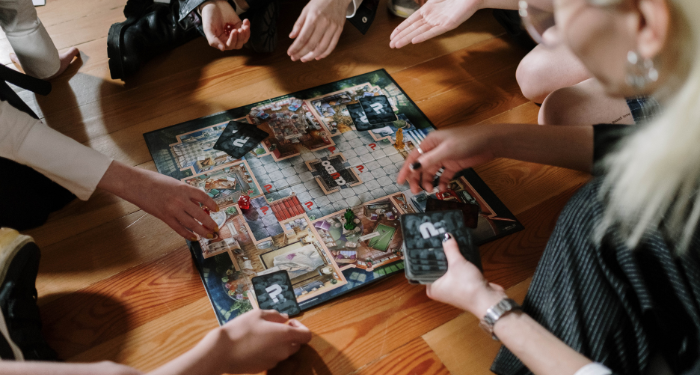
Let the Games Begin! 4 Simple Ways to Include Board Games and Gaming In Libraries
If you’ve read any of my previous Book Riot content (a girl can dream), you may have come across my latest post about books for board gamers. After spending the Thanksgiving holiday board gaming with my family, I’ve been in a gaming mood. Of course, as a gamer at heart, I’m usually in the mood to board game. Currently, I work in a public library, and I’ve begun thinking about board games in the context of the library as well.
The ALA digs into the value of board games in libraries, writing, “Public libraries have a mission to provide a variety of materials in a variety of formats. Board games, card games, and video games are stories and information, presented in new formats. Libraries are about stories and information, not specifically books. Or, as Eli Neiburger says, we’re in the content business.”
I love that phrasing. “The content business.” This is an excellent summation of what libraries offer to the community. As times have changed, the materials offered in libraries have as well. In the days of yore, libraries carried only books and print media. Now they offer a variety of media formats, including CDs, DVDs, and digital books. Libraries have expanded even beyond literacy-based media formats, lending all sorts of useful and interesting items, from museum passes to snow gear. As the ALA explains so well, board games are just another format of stories and information, and they make delightful additions to library collections and programs.
There’s more to board games than just entertainment, though. The ALA emphasizes that “Gaming programs are primarily social events. It’s more about relationship building than gameplay.” They go on to state, “Gaming programs epitomize library as third place, creating a community place between home and work/school to socialize and play.” I love that the library has become a “third place” for people in the community. Relationship building is incredibly impactful for people, and I’m glad libraries work to foster that now. Board games in libraries provide an excellent venue to encourage these social interactions.
Opportunities for socialization hold even more significance in the wake of the pandemic. In a 2021 Library Journal article, Wilkes, Webb, and Enis write: “The COVID-19 pandemic has proven a mental health crisis as many have dealt with isolation, grief, and loneliness. Gaming can provide a shared experience and a way to fill this void.” Those early years of the pandemic were incredibly lonely for me, and the times I did board game with friends amidst the isolation meant so much to me. Board games bring people together, and that’s what libraries are all about.
Drawing on my experience working in libraries and visiting libraries, I’ve put together a list of four simple ways to include board games and gaming in your library. I hope these suggestions will help draw people together at your library too!
4 Ways to Include Board Games and Gaming in Libraries
1. Board Games and Puzzle Stations
An easy way to begin integrating gaming into your library can involve setting up a a space with board games and/or puzzles for patrons to use. Games make for a great passive program in libraries. Patrons can stop by and participate on their own time. In the library I work in now, we have a puzzle table that draws people in just to puzzle sometimes. It’s wonderful to see how community-building puzzles and board games can be and to offer a space for that.
2. Board Games for Check Out
Let’s be honest, board games are expensive. Just as I wish I could own all of the books I love best, I wish my board game collection could include all of my favorites too. I’m no Mr. Monopoly, though, so I appreciate that more libraries are circulating board games in their collections too. Libraries are constantly evolving with the communities they serve. Expanding the types of items available for check out allows libraries to remain relevant and valuable for their patrons.
3. Library Gaming Clubs
You can also support board games and gaming in your library with gaming clubs. Before the public library I work in now, I worked in a high school library. While there, I served as the advisor for the chess club and later the Rubik’s club too. It was so rewarding to see how much our club members enjoyed gaming together. Another Rioter shared how he started a Dungeons & Dragons club at his school library and how meaningful it’s been for him and his students. The library makes for the perfect setting for people with mutual interests in games to gather and play. Participants can develop problem-solving and teamwork skills, make new friends, and have fun.
4. Special Programs
Along with gaming clubs, libraries can also plan special programs focused on games. At my public library, I currently host a trivia tournament, and each month I pick a different theme. It’s been loads of fun. If you’d like to brainstorm different gaming programs for your own library, here are a few ideas to get you started:
- Trivia Tournaments
- Library Escape Rooms
- Bingo
- Role-Playing Games
Board games have been a special part of my life since my days as a kid. They’ve helped me build friendships and feel less alone. It’s wonderful to see how board games are making their way into libraries now too. What kinds of gaming opportunities have you seen in libraries?









